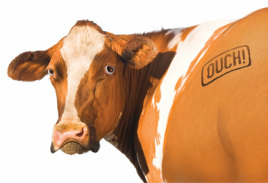
What do all these things have in common?
They are completely uniform, completely predictable, and completely marketable.
To create an author brand, just do what any of these other brands have done. Write a series (Dijon mustard, honey mustard, German mustard). Make sure each book provides the same reading experience (mustard). And churn your "products" out on a schedule (New this week! English mustard!). The combination of predictability and availability (more, more!) is what is known as "trust." And once readers develop "trust," you've got yourself a heap of consumer loyalty.
Frankly, I find the application of assembly-line consumerism to literature to be somewhat appalling. But that did not prevent me from reading the article below. (Or from reading every single one of Alexander McCall Smith's No. 1 Ladies' Detective Agency series.) At least, I now know to avoid agents who talk about developing "author brands" for their clients.
Ouch.
___________________________________________
The Strongest Brand In Publishing Is ...
By David Vinjamuri, Forbes, March 4, 2014
When comparing authors, publishers tend to focus on book sales. But sales figures tell only part of the story. Expensive advertising and a strong push for distribution and display at bookstores might yield strong initial sales but create lots of returns and low profitability. An early and fortuitous movie deal might overexpose a book that doesn’t meet the promise of the movie.
A thousand other externalities make sales data inadequate to measure the strength of an author’s franchise. To understand which authors are worth investing in, publishers need a better measure of an author’s value.
Brand, Not Platform
The metric often used to evaluate new or developing authors is platform – roughly defined as the social reach of the author though Facebook fans, Twitter followers, blog views and speaking engagements. But according to Peter Hildick-Smith of the Codex Group, which polls thousands of readers to determine their preferences and purchase behavior, platform is a misleading metric.
"We’ve seen celebrities with extremely high name recognition and very large platforms fail miserably in book sales. Being famous or having millions of Twitter followers alone is not enough to build a strong franchise as an author."
Hildick-Smith points out that only about half of adults read books and just a fifth are regular book buyers. So a celebrity with a large and dedicated following will not automatically become a bestselling author.
Read on to find out which author has the strongest "brand" more...
 RSS Feed
RSS Feed